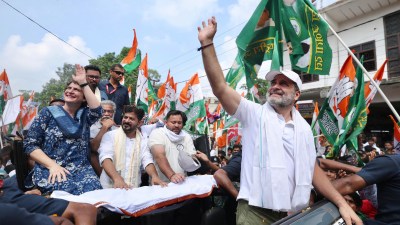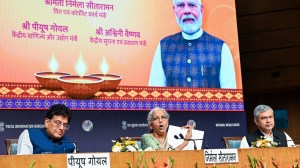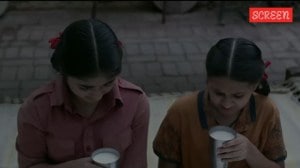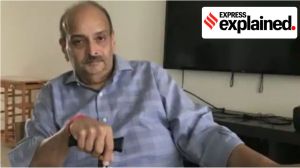The Knife Hidden in the Sleeve
Omair Ahmads new novel is a meditation on violence,its unlikely votaries and its probable victims.
Who becomes a terrorist? In the imaginary town called Moazzamabad,where the greatest violence one could inflict was a cutting remark,an 18-year-old has sunk a knife into a policeman after yelling out,I am Jimmy the terrorist. Omair Ahmads new novel is a meditation on violence,its unlikely votaries and its probable victims. Ahmad doesnt revel in terrorisms gigantic proportions,its weapons and vengeance of mass destruction. He sticks to a mohalla in north India,its crumbling aristocracy,its mosque and its temple,its wayside conversations and a boy who slips a knife up his sleeve.
The novel begins at the end. After Moazzamabad has delivered a self-proclaimed terrorist of its own,the media swoops down,descending like kites upon a fresh kill. In the opening lines,Ahmad packs a critique of journalists hungry for an episode of blood and crime: Their feet barely touch the ground,and when they do,they can only hop about,crippled. No,this isnt their kind of place. These shrill birds look good only in their air-conditioned studios in Delhi and Bombay. But they had to come,didnt they? The blood and meat are here. This trenchant introduction is the only jarring bit because,despite its falcon imagery,it is at odds with the sideways,implied tone that characterises the rest of the book. And,then,the novel begins at the beginning: the unnamed narrator recounts the history of this half-blighted land past the Ghaghra river,and the story of its new terrorist: there was nobody, he says,named Jimmy in Moazzamabad,just a young man named Jamaal Ansari,son of Rafiq Ansari and Shaista Shabbir,who prepared the long road their child would one day take.
As in his earlier book,The Storytellers Tale,Ahmad delights in nuanced prose and interiority his characters often confine themselves to a room and confabulate with themselves in the chaotic recesses of their mind. And,finally,Ahmad dangles the question that attaches itself to all stories: what is the truth in all this?
In Frank Herberts sci-fi novel Dune,there is a line that Ahmad alludes to: What is the son but an extension of the father? So Jamaals tale has to be prefixed with Rafiqs tale. Rafiq,with his Rajesh Khanna hairstyle and intense contempt for his station. Rafiq,who doesnt want to leave his mohalla but wants to shed his middle-classness. Rafiq,who is fixated on the mansion Shabbir Manzil,its Buicks and mehfils. His greatest ambition was to have tea there,to sit among the notables of Rasoolpur mohalla and speak of poetry and cricket,perhaps make a learned comment,but casually,on some bit of politics.
Rafiq finally moves into the Manzil,the one house which determined where you stood in the ranks of society,by marrying Shaista,the proud but poor member of the Shabbir household. But when you so easily trespass the boundaries of class,you have to pay a price for it: in that three-room section of Shabbir Manzil,Rafiq is cut off from his family and friends; and he is taken aback by the passion of his bride at night and her indifference by day. As Rafiq blurts out in a sher at one of the evening mehfils,Hamaara haal kuchh aisa hai,jaise ek dhalti hui deewar hai/ Ek jo sahara mila,kisi aur ke ghar ka kona nikla (My condition is like that of a collapsing wall/ The one support I found was the corner of somebody elses home).
In Shabbir Manzil,Rafiq finds the denial and discovery of love,finds poetry,privileges and patronising and finds himself to be a stranger in his home in the corner of someone elses house. Finally,exiled from it,Rafiq and his son Jamaal take refuge in a mosque. Rafiq metamorphoses from a wannabe poet to a doomsday prophet,who warns,among other things,about the serial Ramayana: They are trying to make everybody a Hindu. It is a conspiracy. Unsheltered,under-privileged,Jamaal faces rejection in his school and watches his only friend Khalid being jailed and Ali Nagar becoming Arya Nagar. The maulana of the mosque who shelters him is burned alive,making half a Hindu out of the Maulana at his death,cremating him before he was buried. Jamaal encounters fear an invisible,obsequious,unshakeable pet,like a mangy street dog that had adopted him,whose sweat grew rancid and soaked into every part of his life and finally Jimmy the terrorist fully formed within himself.
There is politics in the background,from Emergency to Rath Yatra,but Ahmad is not elaborating on them or drawing equations. He is not saying all these will add up to a terrorist,he is saying it could. In a half-blighted land,a confused boy could reach for his knife and become the poster boy of terrorism.



- 0110 hours ago
- 0210 hours ago
- 039 hours ago
- 0410 hours ago
- 0510 hours ago




























